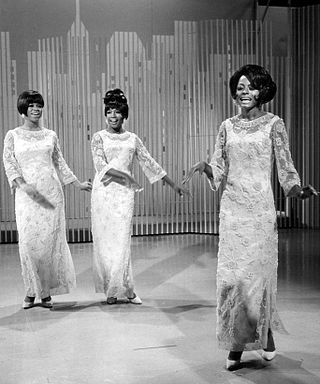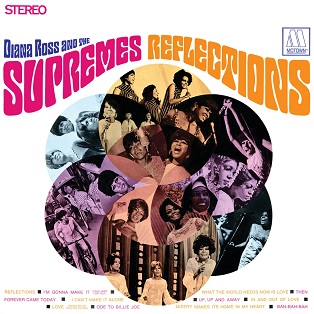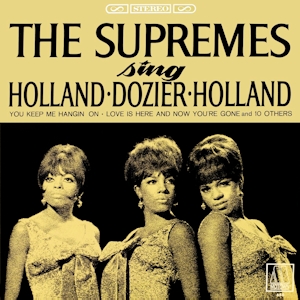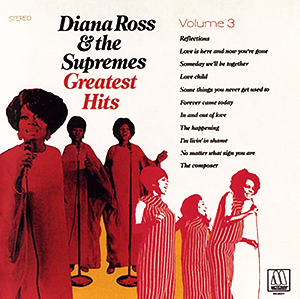
The Supremes were an American girl group formed in Detroit, Michigan in 1959 as the Primettes. A premier act of Motown Records during the 1960s, the Supremes were the most commercially successful of Motown's acts and the most successful American vocal band, with 12 number-one singles on the Billboard Hot 100. Most of these hits were written and produced by Motown's main songwriting and production team, Holland–Dozier–Holland. Their breakthrough is considered to have made it possible for future African-American R&B and soul musicians to find mainstream success. Billboard ranked the Supremes as the 16th greatest Hot 100 artist of all time.

Florence Glenda Chapman was an American singer and a founding member of the Motown vocal female group the Supremes. She sang on 16 top 40 singles with the group, including ten number-one hits. After being removed from the Supremes in 1967, Ballard tried an unsuccessful solo career with ABC Records before she was dropped from the label at the end of the decade.

Mary Wilson was an American singer. She gained worldwide recognition as a founding member of the Supremes, the most successful Motown act of the 1960s and the best-charting female group in U.S. chart history, as well as one of the best-selling girl groups of all-time. The trio reached number one on Billboard's Hot 100 with 12 of their singles, ten of which feature Wilson on backing vocals.

The Supremes A' Go-Go is the ninth studio album released by Motown singing group the Supremes. It was the first album by an all-female group to reach number-one on the Billboard 200 album charts in the United States.

Farewell is a 1970 live album by Diana Ross & the Supremes. The album was recorded over the course of the group's final engagement together at the New Frontier Hotel and Casino in Las Vegas, Nevada, including the final night on January 14, 1970. The show marked Diana Ross' penultimate performance with fellow Supremes members Mary Wilson and Cindy Birdsong. At the conclusion of the show, new Supremes lead singer Jean Terrell was brought onstage and introduced to the audience.

Reflections is the twelfth studio album recorded for Motown by Diana Ross & the Supremes. Released in 1968, it was the first regular studio LP to display the new billing of the group formerly known as "The Supremes." It contains the singles "Reflections", "In and Out of Love" and "Forever Came Today". Also included are covers of songs made famous by Martha and the Vandellas and The 5th Dimension. Also present are songs written by other famous names, including "Bah-Bah-Bah" co-written by Motown singer Brenda Holloway with her younger sister, Patrice, an original Smokey Robinson composition titled "Then", and "What the World Needs Now Is Love" by Burt Bacharach and Hal David, which Motown planned to release as a single in the spring of 1968, but cancelled. It also contains a cover of Bobbie Gentry's "Ode to Billie Joe," whose original recording kept the single #2 "Reflections" from peaking at the top spot on the Billboard Hot 100 in September 1967, and it hit #2 on Cashbox.

Where Did Our Love Go is the second studio album by Motown singing group the Supremes, released in 1964. The album includes several of the group's singles and B-sides from 1963 and 1964. Included are the group's first Billboard Pop Singles number-one hits, "Where Did Our Love Go", "Baby Love", and "Come See About Me", as well as their first Top 40 hit, "When the Lovelight Starts Shining Through His Eyes", and the singles "A Breathtaking Guy" and "Run, Run, Run".

The Supremes Sing Holland–Dozier–Holland is the tenth studio album released by The Supremes for Motown in 1967. It includes the number-one hit singles "You Keep Me Hangin' On" and "Love Is Here and Now You're Gone". As the title states: all songs on the album were written and produced by Motown's main songwriting team of Holland–Dozier–Holland. Most of the album was recorded during the spring and summer of 1966; however several songs date back to the summer of 1964.

Cream of the Crop is the eighteenth studio album released by Diana Ross & the Supremes for the Motown label. It was the final regular Supremes studio album to feature lead singer Diana Ross. The album was released in November 1969, after the release and rising success of the hit single "Someday We'll Be Together."

Meet the Supremes is the debut studio album by The Supremes, released in late 1962 on Motown.

Merry Christmas is the seventh studio album recorded by Motown girl group The Supremes, and released on Motown Records in November 1965. The LP, produced by Harvey Fuqua, includes recordings of familiar Christmas songs such as "White Christmas", "Santa Claus Is Coming to Town", "My Favorite Things", and "Joy to the World". Two originals, "Children's Christmas Song" and "Twinkle Twinkle Little Me", were issued as a single. Neither Wilson nor Ballard sing on the original 1965 release of "Merry Christmas". They were exhausted from their lengthy run of performances at the Copacabana, so the Andantes were used instead.

Live at London's Talk of the Town is a 1968 live album released by Diana Ross & the Supremes on the Motown label, recorded at the Talk of the Town nightclub. This performance marked the first time that new member Cindy Birdsong had performed overseas with original Supremes Diana Ross and Mary Wilson, a year after original founding member Florence Ballard was ousted. The group performed a variation of standards, show tunes, and their own classics with British rock stars Mick Jagger and Paul McCartney reportedly in attendance. The songs recorded are from the group's 1968 European tour. That European tour also garnered a famous Swedish television special that was used as a catalyst to promote this album.

Diana Ross & the Supremes: Greatest Hits Vol. 3 is a 1969 compilation album by Diana Ross & the Supremes, released on the Motown label. It features all of the hits released by the group between 1967 and 1969 save for the Supremes/Temptations duet singles. After Florence Ballard's mid-1967 departure from the group, Supremes singles were recorded by Diana Ross with session singers The Andantes on backgrounds instead of new Supreme Cindy Birdsong and founding member Mary Wilson, including "Love Child" and "Someday We'll Be Together".

Anthology, also known as Anthology: The Best of Diana Ross and the Supremes, first released in May 1974, is a series of same or similarly titled compilation albums by The Supremes. Motown released revised versions in 1986, 1995 and 2001. In its initial version, a 35-track triple record collection of hits and rare material, the album charted at No. 24 on Billboard's "Black Albums" and No. 66 on "Pop Albums".
"Let Me Go the Right Way" is a 1962 song written and produced by then Motown president Berry Gordy and released as a single by Motown singing group The Supremes. It was the group's fourth single and their second charted record following the dismal reception of their first charted single, "Your Heart Belongs to Me".

"When the Lovelight Starts Shining Through His Eyes" is a song written by Holland–Dozier–Holland and recorded in 1963 by the Motown singing group the Supremes. It is notable as the Supremes' first Billboard Hot 100 Top 40 recording, following seven previous singles between January 1961 and September 1963 which failed to enter the Top 40. The single is also notable as the first Supremes single written and produced by Holland–Dozier–Holland, who had previously created hits for Martha and the Vandellas and Mary Wells.

"Nothing but Heartaches" is a 1965 song recorded by the Supremes for the Motown label.

"In and Out of Love" is a 1967 song recorded by The Supremes for the Motown label. It was the second single issued with the group's new billing of Diana Ross & the Supremes, the penultimate Supremes single written and produced by Motown production team Holland–Dozier–Holland, and the last single to feature the vocals of original member Florence Ballard.

Diana Ross & the Supremes Sing and Perform "Funny Girl" is the thirteenth studio album released by Diana Ross & the Supremes on the Motown label, released in 1968. Berry Gordy had Diana Ross & the Supremes cover the songs from Barbra Streisand's Broadway musical Funny Girl original cast LP to tie-in with the September release of the feature-film version of the musical, also starring Streisand. The LP was not a success, and, with a Billboard 200 peak of 150, ranks as the lowest-charting of the Diana Ross-led Supremes albums.

"Where Did Our Love Go" is a 1964 song recorded by American music group the Supremes for the Motown label.



















